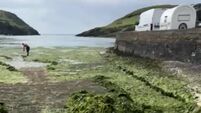11-year-old Cork boy settles case over circumstances of his birth for almost €20m

Alex Foley has spastic diplegic cerebral palsy but can now walk up to two kilometres after key surgery in the US.
An 11-year-old boy with cerebral palsy who sued over the circumstances of his birth at Cork University Maternity Hospital has settled his High Court action for almost €20m.
In the High Court today, a final lump sum payment of €18m was approved for Alex Foley from Midleton, Co. Cork, bringing to €19.98m the amount secured in his case.













